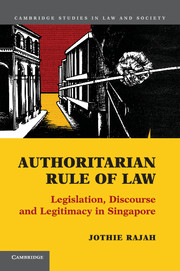Book contents
- Frontmatter
- Contents
- An Insider’s Preface on ‘Rule of Law’ Confusions
- Acknowledgements
- 1 Law, Illiberalism and the Singapore Case
- 2 Law as Discourse
- 3 Punishing Bodies, Securing the Nation
- 4 Policing the Press
- 5 Policing Lawyers, Constraining Citizenship
- 6 Policing Religion
- 7 Entrenching Illiberalism
- 8 Legislation, Illiberalism and Legitimacy
- Bibliography
- Index
- References
3 - Punishing Bodies, Securing the Nation
1966 Vandalism Act
Published online by Cambridge University Press: 05 June 2012
- Frontmatter
- Contents
- An Insider’s Preface on ‘Rule of Law’ Confusions
- Acknowledgements
- 1 Law, Illiberalism and the Singapore Case
- 2 Law as Discourse
- 3 Punishing Bodies, Securing the Nation
- 4 Policing the Press
- 5 Policing Lawyers, Constraining Citizenship
- 6 Policing Religion
- 7 Entrenching Illiberalism
- 8 Legislation, Illiberalism and Legitimacy
- Bibliography
- Index
- References
Summary
The Vandalism Act was the first legislative instrument enacted in the ‘nation’ to prescribe mandatory corporal punishment. The state discourse of the time, directed at legitimising corporal punishment, is therefore central to a particular construction of the role of ‘lawful’ violent punishment in the vulnerable Singapore ‘nation’. At the time it was enacted, through context and sub-text, the state used the Vandalism Act to demarcate certain expressions of opposition politics as criminal and anti-national – thus consolidating the state’s power over the space of ‘nation’, in both material and discursive terms. But the 1994 use of the Vandalism Act (discussed in the second half of this chapter) reveals that, in addition to being a vehicle for repressive technologies (corporal punishment, incarceration and heightened surveillance), the Act has become a vehicle for state pedagogy, such that the ‘citizen’ is instructed on how to constitute individual identity in terms of ‘good’ citizenship, virtuous conduct and ‘Asian values’.
Both the 1966 enactment and the 1994 enforcement of the Act are marked by a thematic constant in state discourse: the insistence that Singapore is an exceptionally vulnerable nation with exceptional circumstances necessitating ‘tough laws’ (symbolised by violent punishment) in order that the always vulnerable Singapore ‘nation’ might be rendered less vulnerable. This theme, cast in the rhetoric of nationalism, masks an appropriation of ‘law’ in the service of pedagogy such that, even if conducted behind prison walls, caning becomes instructive public spectacle. It is the high degree of violence and the state’s capacity to legitimise this violence that serve to control the (notionally) watching citizen. This chapter traces some of the expansive and malleable ways in which, through the Vandalism Act, ‘law’ as governance has manifested so as to reconfigure ‘rule of law’ ideals into a form of ‘rule by law’ that maintains legitimacy for state violence.
- Type
- Chapter
- Information
- Authoritarian Rule of LawLegislation, Discourse and Legitimacy in Singapore, pp. 65 - 116Publisher: Cambridge University PressPrint publication year: 2012



